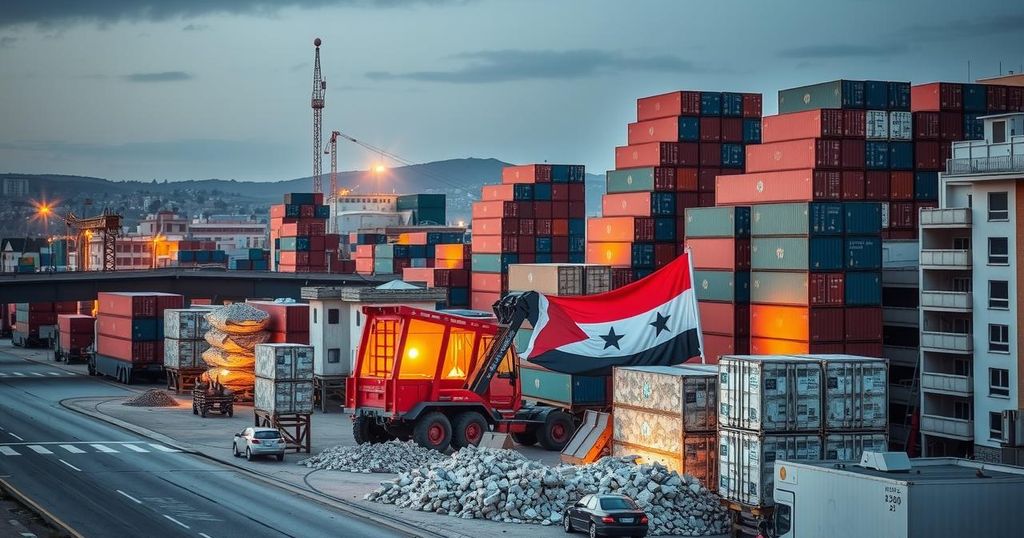Jordan is actively seeking to strengthen ties with post-Assad Syria to enhance border security and capitalize on economic opportunities through reconstruction efforts. Key discussions focus on security issues, trade, and energy supply, with plans to establish logistics frameworks to facilitate aid to Syria. Despite previous challenges, Jordan aims to leverage its assets in support of Syria’s recovery, while addressing pressing security concerns associated with border management and smuggling activities.
In the wake of Syria’s recent governmental shift following the fall of Bashar al-Assad, Jordan has swiftly positioned itself to enhance economic ties and ensure border security. Foreign Minister Ayman al-Safadi visited Damascus promptly to engage with Syria’s interim leadership. Thereafter, a Syrian delegation visited Amman to discuss vital issues such as drug smuggling, energy supplies, trade relations, and the reintegration of Syrian refugees. Safadi announced the formation of collaborative committees aimed at addressing these concerns, emphasizing the strategic importance of bilateral cooperation due to their 378 km shared border.
Political analyst Monther al-Hawarat highlighted the potential for Jordan to become instrumental in Syria’s reconstruction, suggesting that Jordan’s support could help lift sanctions affecting Damascus, thereby aiding economic recovery. Jordan aims to capitalize on Syria’s rebuilding as a growth opportunity, with projected benefits in trade and logistics. Furthermore, Jordan plans to assist Syria in stabilizing its governance structure and rehabilitating previously sanctioned leaders.
The two nations have faced considerable economic challenges since the civil war began in 2011, notably with a significant drop in trade volumes and frequent border closures. However, Jordan has initiated fresh efforts to rekindle economic exchanges, exemplified by the announcement of a new inland port in Mafraq, which is intended to serve as a logistics hub facilitating the transport of construction materials to Syria.
Economic experts assert that Jordan has uniquely positioned itself to benefit from Syria’s recovery due to its cost-effective transportation options and availability of essential goods and services. Additionally, Jordan’s support for Syria’s energy sector, with plans to supply electricity and rehabilitate power grids, could further enhance bilateral relations and economic interdependencies. Steps are being taken to negotiate exemptions from international sanctions, including the Caesar Act, which would enable deeper trade collaborations and channel resources into Syria’s rejuvenation.
With the looming threat of smuggling and security challenges, Jordan has articulated a commitment to improving border security. However, military analysts express skepticism regarding the feasibility of restoring security effectively given the complex landscape of armed factions within Syria. Prior engagements with Syrian opposition forces were limited and targeted, complicating potential new collaborations. Ultimately, while Jordan’s reassertion in Syria presents significant economic and strategic opportunities, the process of reconstruction and stabilization remains fraught with challenges that necessitate careful navigation.
Historically intertwined, Jordan and Syria’s relationship has seen significant shifts due to the Syrian civil war, which has had profound implications on regional security and economic exchanges. The overthrow of Assad’s regime has opened a new chapter for Jordan, as it aims to harness the potential for cooperative development in post-war Syria. Given that both nations contend with challenges such as border security and economic revival, their renewed interaction signifies a strategic maneuver by Jordan to exert influence and facilitate stability in a historically volatile region. Furthermore, Jordan’s desire to aid in Syria’s recovery is driven by both altruism and self-interest, as economic revitalization in Syria could offer substantial trade and investment prospects for Jordan, which has been adversely affected by prolonged regional conflicts.
In conclusion, Jordan’s proactive engagement with post-Assad Syria is driven by the dual objectives of securing its borders and reaping economic benefits from the reconstruction of a war-torn neighbor. Key discussions have initiated protocols to tackle border security, trade revitalization, and energy sector collaboration. However, the path forward is complicated by regional sectarian dynamics and smuggling threats, which underscore the need for robust security strategies in the evolving geopolitical landscape. As Jordan positions itself as a key player for stability and reconstruction in Syria, its approach must adapt to the complexities of international sanctions and local military factions.
Original Source: www.middleeasteye.net






